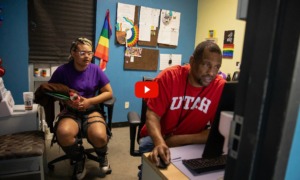
WASHINGTON — In the leadup to the election, public health and medical professionals are urging the next administration to invest in improving the health of children and teenagers by looking at all aspects of their lives.
The key to better health lies not just in insurance access or visits to the doctor but in improving the social services families can access and the neighborhoods they live in, experts say. That means looking at programs across federal departments and how they interact with state and local efforts.
“We look upstream. We’re not just looking at programs under the Department of Health and Human Services,” said Rich Hamburg, interim president and CEO of the Trust for America’s Health.
The nonprofit public-health organization based in Washington, District of Columbia, released its recommendations for the next administration and Congress Wednesday, arguing that many evidence-based strategies would both improve health and save money.
The report includes numerous recommendations related to youth, such as investments in nutrition and early childhood programs, preventing physical abuse, substance use and toxic stress, and reducing obesity.
“It’s certainly easier and more productive to have a child grow up healthier rather than address things 30 or 40 years on down the line,” Hamburg said.
The improvements depend on a multisector approach that includes community-based organizations and their knowledge of conditions on the ground, he said.
[Related: Kids in the Presidential Campaigns: How the Front-runners Stack Up on Children’s Issues]
For example, creating more safe places for children to play could help curb obesity rates, and one way to do that might be to keep schools open after hours for community programs, Hamburg said. But the success of doing so depends on a strong partnership between the schools and local groups in a joint use agreement.
“The idea is to bring in community leaders who recognize local priorities,” he said.
In addition, the group said health improvement strategies that come from the federal government should be flexible enough for local communities to prioritize their needs and goals.
Pediatricians recommend broad reforms
Similarly, the American Academy of Pediatrics recently released its own blueprint for the incoming administration. Like the Trust for America’s Health, the group took a broad look at health for children and youth, including economic conditions, neighborhood structure and tax policy.
“When a family lacks access to steady income, stable housing, adequate nutrition, and social and emotional support, it threatens the future of children and undermines the security of the nation as a whole,” the group said in the report.
The report highlights the importance of building strong communities, including minimizing children’s exposure to violence by enacting gun violence prevention strategies. The AAP also said too many children face early expulsions and suspensions that can affect their educational and life experiences.
In addition, the report calls on the U.S. Justice Department to strengthen the key federal law that protects juveniles in custody and to boost funding for federal juvenile justice programs.
The recommendations from the Trust and AAP come in the midst of a presidential campaign where headlines have focused little on the needs of children. But officials want to state their priorities with the hope they will translate into priorities next year.
“While the realities of the political process will necessitate choices and prioritization, the AAP believes that children deserve no less than a bold agenda for improving their lives, and that is just what we have recommended for our nation’s future leaders,” said Benard P. Dreyer, the president of the group.
More related articles:
Strong Education Programs, Supports Can Be Potent for Justice-Involved Youth
Keeping Schools Safe While Reducing Suspensions and Expulsions
Report: Communities Can Do More to Support Children with an Incarcerated Parent

























